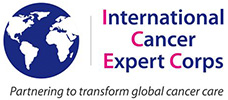ICEC hosted second in a series of receptions: “Partnering to Transform Global Cancer Care”
On October 5, 2016, the International Cancer Expert Corps Board of Directors hosted the second in a series of receptions, “Partnering to Transform Global Cancer Care” at the New York Athletic Club in New York City. The purpose of the event series is to introduce the efforts of the organization to friends and colleagues in the corporate, scientific, governmental and philanthropic communities.
This well-attended event, made possible through the generous financial and in-kind support of Strategic Visions in Healthcare; the Princess Margaret Cancer Centre Radiation Medicine Program in Toronto, Ontario; Pfizer, VIA Studios Global and others companies and individuals, attracted a broad range of interested guests. Attendees included representatives from Cancer Africa, Columbia University, Duke Cancer Institute, Icahn School of Medicine at Mount Sinai, International Organization of Medical Physics, Massachusetts General Hospital, Harvard Medical School, Medical College of Wisconsin, Memorial Sloan Kettering Cancer Center, MIT, Mount Sinai Comprehensive Cancer Center, NCI Radiation Research Program, New York-Presbyterian, Nuclear Threat Initiative, NYU Langone Medical Center, Pace University, Pfizer, Seaton Hall University, Starr Foundation, Strategic Visions in Healthcare, UN Coordination Division, United Office for Disarmament Affairs, UPENN, VIA Global Studio, Weill Cornell Medical College, Winthrop University Cancer Center and many others.
The evening was highlighted by a short program which included overviews of several initiatives focused on access to, and the delivery of, global cancer care. Dr. Norm Coleman, Senior Scientific Advisor to the ICEC, set the stage emphasizing the significant burden of non-communicable diseases in Low- and Middle-Income Countries, and that this burden has been recognized by the United Nations and is now a part of its Sustainable Development Goals. Dr. Coleman proffered that the need for transformational change in global cancer care can be addressed by the ICEC’s global mentorship model that leverages opportunities for academics, retirees and healthcare providers in private practice, while also considering new technologies to improve access to care. Referring to the Gap projections stated by the IAEA, “If only one effective radiation treatment unit is commissioned every week, it will take a century to solve this problem”. The shortage of human capital, as well as medical technology, is staggering.
Dr. Nelson Chao, MD, MBA, Director of the Global Cancer Institute at Duke University, reflected on the importance of collaborations in efforts to make substantive improvements in global health initiatives. He highlighted Duke’s efforts across multi-specialty disciplines in Tanzania. This collaboration illustrates the importance of ICEC’s mission and the need to support and sustain this work in LMICs and other challenging environments.
John “Mac” Longo, MD, of the Medical College of Wisconsin described the efforts of radiation oncology residents as members of the Association of Residents in Radiation Oncology (ARRO). These individuals, using their enthusiasm and initiative, have taken the initiative to increase awareness of health care disparities and opportunities to improve the quality of cancer care worldwide. As one of ICEC’s Ellen Lewis Stovall Early Career Leaders, Mac has been instrumental in promoting his recent experiences and successes as part of an expanding global focus. Mac shared his experiences working with the Walking Forward Program in South Dakota. This successful Cancer Disparities Research Partnership (CDRP) pilot program was initiated by the Radiation Research Program (RRP) within the National Cancer Institute (NCI)’s Division of Cancer Treatment and Diagnosis (DCTD) in 2002 as a novel strategy to address the cancer health disparities that exist in racial, ethnic, minority, and underserved populations within the United States.
Onyinye Balogun, MD, Assistant Professor of Radiation Oncology at Weill Cornell Medical College, described her efforts focused on Global Health Programs at the National Center for Oncology in Yerevan, Armenia and at the Libreville Cancer Institute in Libreville, Gabon. Onyi shared some of the surprising conditions often found in existing healthcare centers in LMICs and the challenges faced trying to implement protocol- or guideline-based care. Working with local healthcare providers, Onyi focused on designing and delivering a training curriculum to transition radiation oncologists, therapists and medical physicists from delivering 2-D Radiotherapy to the safe and effective delivery of 3D- Conformal and Intensity Modulated Radiotherapy where there previously had been none. In addition, Onyi painted a chilling picture illustrating the critical need for mentoring partnerships for fledgling healthcare professionals who currently have little-to-no support. Though Onyi has experienced many trials and tribulations, her singular efforts and the efforts of others have been met with enthusiasm from in-country healthcare providers and have served as a catalyst to make a significant difference in the delivery of cancer care in these two countries.
Lastly, Silvia C. Formenti, MD, the Chair of Radiation Oncology at Weill Cornell Medical College and Radiation Oncologist-in-Chief at New York-Presbyterian/Weill Cornell Medical Center, emphasized the enormous disparities in the delivery of healthcare and the importance of ICEC and other similar efforts and organizations to succeed. Stressing that while many people recognize the urgency to transform the delivery of global cancer care, the many small effective programs that currently exist do so in numbers far below the scope required. The ICEC is well positioned to expand and pair its mentoring network of expert healthcare providers with global partners to make immediate significant measured improvements in cancer care.
October 5, 2016, Reception – Organizations Represented
Cancer Africa
Catholic Medical Mission Board (CMMB)
Columbia University
Duke Cancer Institute
Glenmede
Harvard School of Medicine
Icahn School of Medicine at Mount Sinai
International Organization of Medical Physics
Massachusetts General Hospital
Harvard Medical School
Medical College of Wisconsin
Memorial Sloan Kettering Cancer Center
MIT
Mount Sinai Comprehensive Cancer Center
Mount Sinai Hospital
NCI Radiation Research Program
New York-Presbyterian/Queens
Nuclear Threat Initiative
NYU School of Medicine, NYU Langone Medical Center Perlmutter Cancer Center
Pace University
Pfizer
Seaton Hall University
Starr Foundation
Strategic Visions in Healthcare
United Nations Coordination Division
United Office for Disarmament Affairs
Perelman School of Medicine at the University of Pennsylvania
VIA Global Studio
Weill Cornell Medical College



